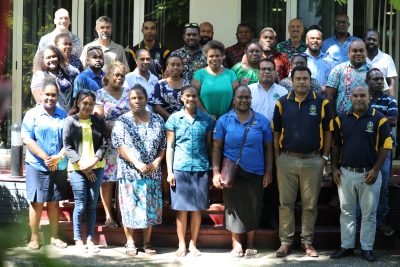Solomon Islands reaches Net Zero
Green House Gas (GHG) Assessment carried out under the Third National Communication to the United Nations Framework Convention on Climate Change indicated that Solomon Islands has already reached net zero and thus become a carbon sink through GHG removals from tropical forests.
However, we need to be vigilant to ensure we do not allow our emissions to surpass removals into the future.
This statement was made by the Permanent Secretary for Ministry of Environment Climate Change Disaster Management and Meteorology, Dr. Melchior Mataki when addressing stakeholders who gathered in Honiara to validate the Solomon Islands Low Emission Development Strategy (LEDS).
Reaching net zero refers to the balance between the amount of greenhouse gas (GHG) that’s produced, and the amount that’s removed from the atmosphere.
It can be achieved through a combination of emission reduction and emission removal.
The Solomon Islands is least responsible for the human induced change in our global climate system and yet we are at the forefront of climate change impacts.
Regardless of our situation we recognize our role in the global effort to curtail GHGs emission. This is particularly important because major emitters and those with historical responsibility are doing very little to drastically reduce their emissions.
The benefits of shifting to a low carbon society are sufficient on their own to warrant the shift irrespective of the requirements of the Paris Agreement.
A high GHG emitting society is indicative of unsustainable production and consumption patterns and behaviors. As such a LEDS is needed for the Solomon Islands.
PS Mataki says the Solomon Islands LEDS which started way back in 2021 seeks to explore the challenges and opportunities associated with transformational changes that is needed to maintain our net zero status, while at the same time continue to work on reducing our GHG emission from the energy, agriculture, industrial processes and product use and waste.
The purpose of the LEDS is twofold, first it will be for local application and second for international cooperation. Domestically it will complement short- and medium-term development and sectoral strategies of the country including the National Development Strategy, National Climate Change Policy, National Determined Contributions and the National Forestry policy.
On the international front, it will be used to help Solomon Islands meet its obligations and support climate action on the global level under the Paris Agreement.
Ends///
– MECDM PRESS RELEASE

